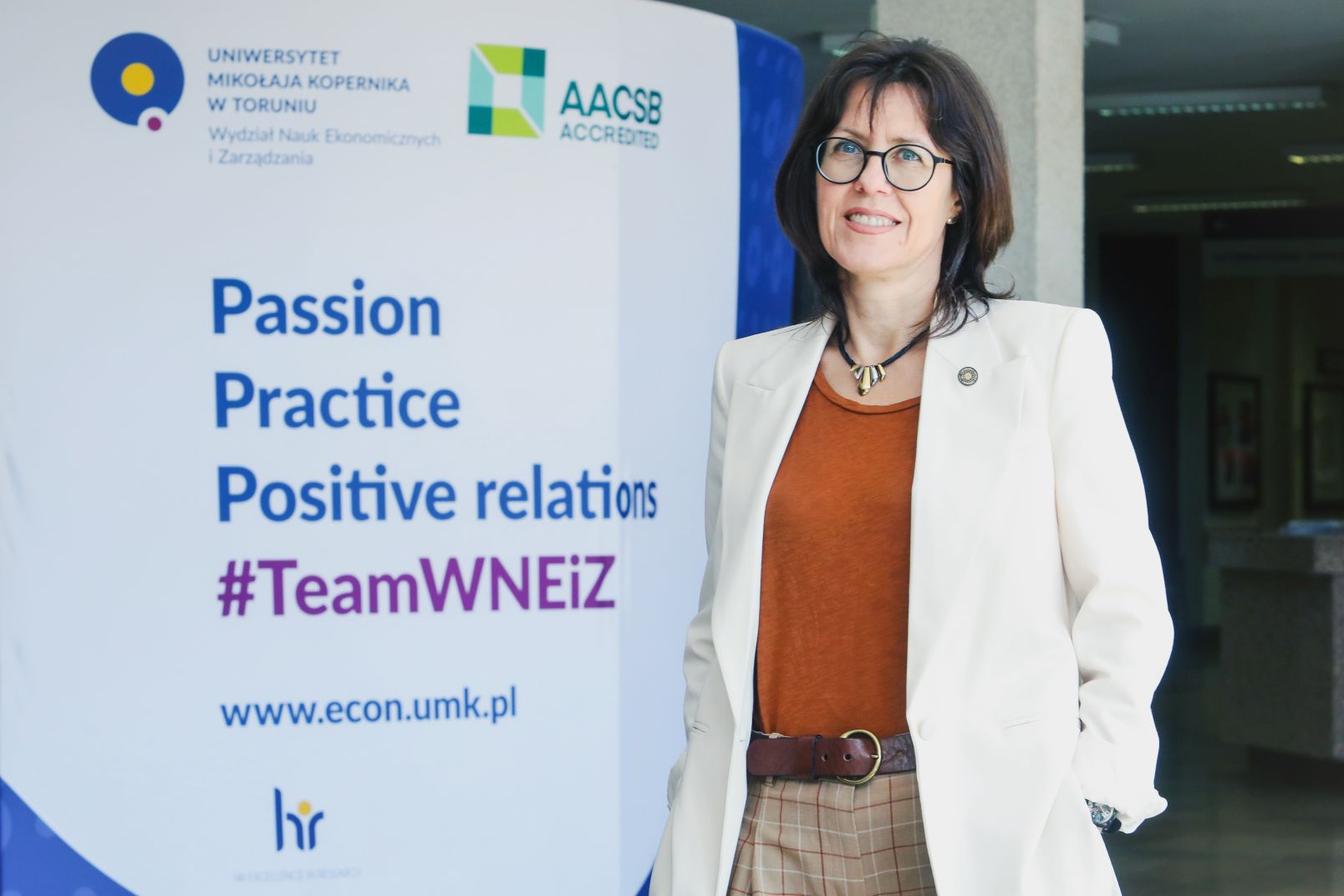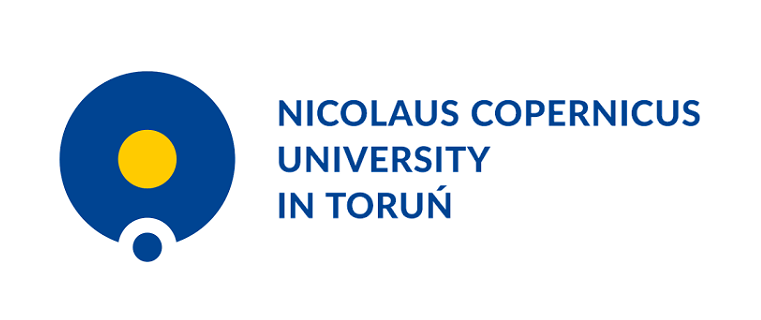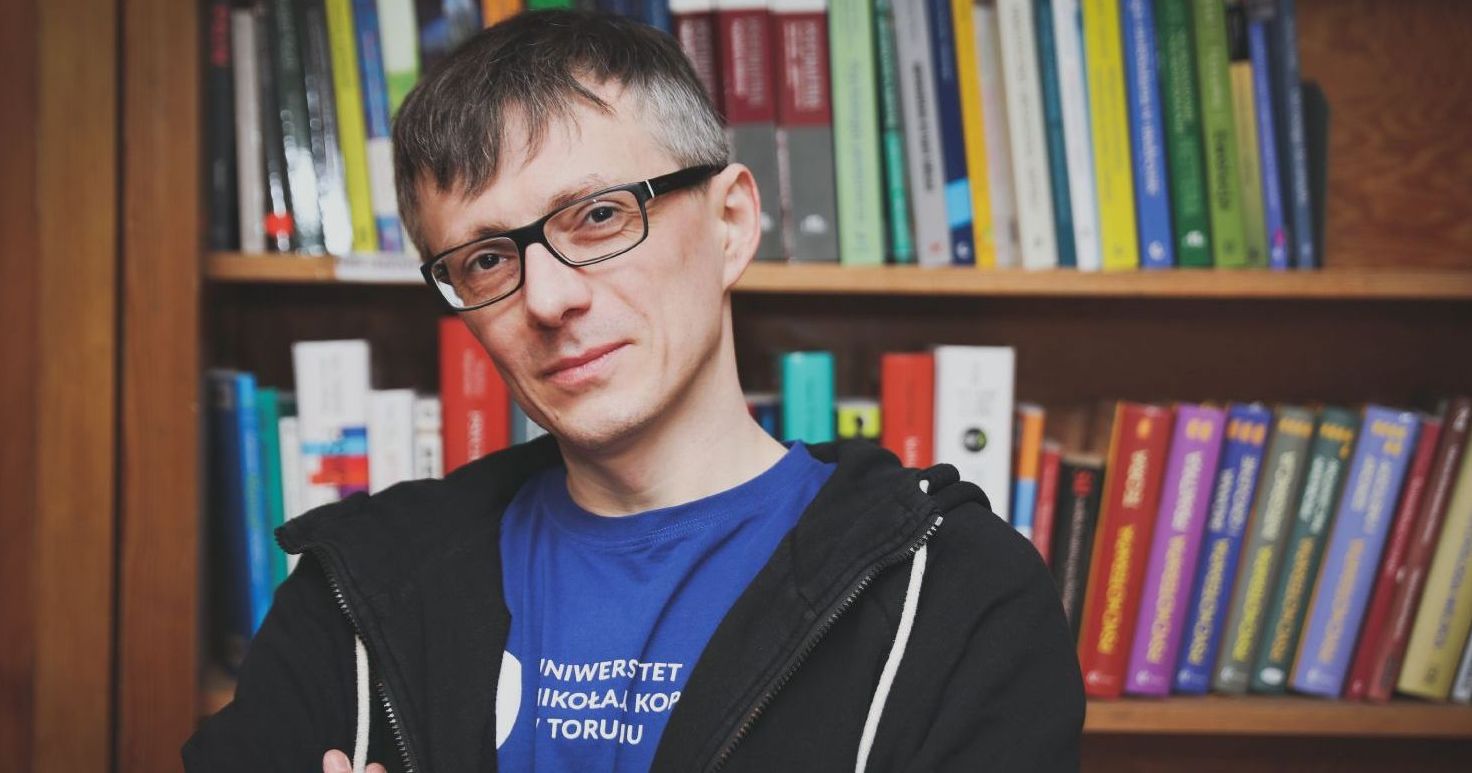 Social sciences
Social sciences
Positive spiral of dependencies
- Pursuing excellence at work, and therefore happiness, is possible if you focus on your strengths and talents, rather than on problems and attempts to eliminate them - says Prof. dr habil. Aldona Glinska-Neweś, from the Department of Organisational Behaviour and Marketing at the Faculty of Economic Sciences and Management of the Nicolaus Copernicus University.
At the end of 2015. the Nicolaus Copernicus University was the first university and seventh institution in Poland to have been granted the prestigious Human Resources Excellence in Research award. Awarding it is one of the activities of the European Commission as part of the Human Resources Strategy for Researchers, aimed at increasing the attractiveness of working conditions for researchers in the EU.
In order to obtain the HR Excellence in Research logo, the Nicolaus Copernicus University had to carry out an internal analysis and check the extent to which its functioning is consistent with the European Charter for Researchers and the Code of Conduct for the Recruitment of Researchers. On the basis of the findings, an HR strategy and an action plan were then prepared to identify the most important shortcomings with a description of specific actions leading to their elimination.
Importantly, the HR Excellence in Research logo is awarded on a temporary basis. The Nicolaus Copernicus University is currently seeking its renewal and extension - the commission is currently checking how we have fared in implementing the principles of the Charter and the Code. On this occasion, we would like to present the research interests of Professor Aldona Glińska-Neweś from the Department of Organisational Behaviour and Marketing at the Faculty of Economic Sciences and Management at the Nicolaus Copernicus University, whose research focuses, among other things, on the Positive Organisational Potential. Building a positive organisation is worthwhile
Positive Organisational Scholarship
Positive Organisational Scholarship is a relatively young movement - it was developed in the past two decades, although its roots go back a lot earlier. They can be found primarily in the management sciences, but also in other social sciences, especially in positive psychology.
The origins of the movement can be seen in the establishment of the Center for Positive Organisational Scholarship at the University of Michigan in the USA in 2002, and the publication of the book "Positive Organisational Scholarship: Foundations of a New Discipline" by researchers there. This field of study inspired Prof. Aldona Glińska-Neweś's team, which in recent years has focused on the study of organisational behaviours, especially interpersonal relations at work, inter-organisational relations, organisational culture and cultural differences in management. The researchers from the Nicolaus Copernicus University in Toruń have been particularly interested in the positive characteristics of the organisation and its members, as well as the positive processes taking place in organisations and the results that have been achieved by them. The researchers have focused on phenomena such as employee wellbeing, experiencing a sense of meaningfulness at work, positive interpersonal relationships and the processes that create and strengthen employees' creative potential.
This potential enriches the individual capabilities of the members of a given organisation, which makes it possible to create innovative solutions and achieve above-average results. This leads not only to the achievement of employees' aspirations and goals, but also to the development of the entire organisation - explains Professor Aldona Glińska-Neweś from the Department of Organisational Behaviour and Marketing.
A prerequisite for creative processes to occur in any organisation is the experience of positive emotions in the workplace, as researchers have shown. These motivate people to strive harder at work, to excel in their work, to look for unconventional and creative solutions and to broaden their mental horizons.
We can speak of a "positive spiral of dependencies" in the organisation: positive emotions foster the feeling of positive energy, which in turn influences the level of commitment, increasing the effectiveness of the organisation as a whole. This, in turn, provides a catalyst for further triggering of employees' positive emotions - explains Prof. Glińska-Neweś.
It is not about rose-coloured glasses
The Positive Organisation Scholarship is not regarded as a serious research topic by all scholars. Some attribute a note of naivety to this approach.
- Interestingly, this is not only the domain of Polish scholars, in fact this trend is received with some resistance everywhere. We are dealing with a rather superficial treatment of this approach - people attribute naivety to it, claiming that it means looking at an organisation and the processes and phenomena occurring within it through rose-coloured glasses - says Prof. Glińska-Neweś. – Meanwhile, the difference lies in the way of looking at the analysed problems. Previous research largely focused on difficulties and deficits and how to solve them. The assumption accompanying this research was that positive things would emerge in organisations when the negative ones were eliminated. Thus, overcoming resistance to change, resolving conflicts, eliminating communication barriers, dealing with lack of motivation to work, among others, were addressed. Meanwhile, preventing negative processes is not at all synonymous with creating positive phenomena. Moreover, focusing on difficulties and barriers paradoxically encourages their emergence, making it all the more difficult to achieve positive states.

Therefore, according to the Positive Organisational Scholarship, it is more important to focus on one's talents and strengths on the road to success (both as an individual and as an organisation), rather than on one's weaknesses and attempts to eliminate them. Notably, this absolutely does not mean downplaying or not noticing negative phenomena and characteristics. However, the point is that focusing on and developing strengths is recognised as a more effective way of dealing with them.
- There are more and more tools and instruments to measure our strengths. This gives people a fuller awareness of who they are, what they are good at and makes it easier to build their career path - notes the researcher.
Work and a sense of happiness
The perspective adopted in the Positive Organisational Scholarship has a strong connection with the development of positive psychology, about which, in a nutshell, we can say that it searches for the sources of human happiness, since happiness is what people strive for throughout their lives. The concept of 'flow' is inspiring in this context, stating that, although activities of all kinds are undertaken for the sake of a vision of results that are supposed to lead to happiness, happiness is actually felt during the activity and not afterwards. This is why, once you have completed a particular activity, you start planning the next one - after all, you want to experience happiness.
This concept can thus form the basis for employee motivation. A job in which a person uses and develops his or her strengths and talents, does something that is personally meaningful, and experiences positive interactions with others, can be a source of happiness as much as leisure time or other spheres of life - explains Prof. Glińska-Neweś.
Work, I enjoy being here
The Positive Organisation Scholarship, in its own way, defines working conditions that contribute to the development of the whole organisation.
A good environment is one in which employees know their strengths, understand their desires and achieve personal goals in harmony and in good working relationships with their colleagues. For this to be possible, team members must trust and like each other. Yes, like each other - the importance of likeability in management is very high - says Prof. Glińska-Neweś. - An employee group is definitely more productive when this component is not missing. Positive relationships are a prerequisite, although obviously not sufficient, for optimal productivity.
We will be more creative, productive and satisfied when we feel comfortable in our group of colleagues. It is also important to feel free and express ourselves - to be "ourselves", without fear of being judged or treated badly.
- The American approach places great emphasis on the expression of all emotions at work. For example: if I feel that I can show my rage without being afraid that it will damage our relationship, it means that we are in a positive relationship - explains Prof. Glińska-Neweś. - In Poland, however, we look at the relationship a little differently - we rarely show strong emotions, especially negative ones; instead, we are more willing to include our private sphere into our relationships with co-workers. We have done qualitative research, asking, among other things, what positive relationships at work mean to our interviewees. A lot of people said that a good relationship is when they can confide in each other, talk about their personal problems.
Therefore, an important part of strengthening bonds between employees is spending time together (also in situations outside work), sharing positive experiences and celebrating successes together.
It's good to like the boss too
In management, there is no ideal leadership style, no prescriptions, golden rules and principles. What appeals to me is the concept of "authentic leadership", i.e., leading a team in accordance with one's own personality and professed values - says Prof. Glińska-Neweś.
Prof. Glinska- Neweś emphasises that employees find the predictability of their supervisor's behaviour, resulting from such authenticity, important. At the same time, a good and well-functioning team is one in which the leadership style matches the expectations of the employees, their competences, the nature of the task. This leads to the building of positive relationships and therefore positive outcomes for both the employees and the organisation as a whole.
The power of volunteering
Recently, Prof Glinska-Neweś and her team have been equally involved in research on sustainability, corporate social responsibility and consumer and employee actions, referred to as "green behaviour".
- One topic that is of particular interest and concern to us is employee volunteering, which is very much on the rise all over the world, including in Poland - says Prof. Glińska-Neweś. - It is an activity that is linked to CSR, and more specifically to corporate social commitment. And it has very positive effects, while not being at all about the organisation's PR. Volunteering is extremely important for integration, relations and effective communication within the company. It also gives employees a sense of meaningfulness in their work and belonging to the organisation. All this, of course, fits perfectly with the Positive Organisational Scholarship.
 NCU News
NCU News







 Social sciences
Social sciences